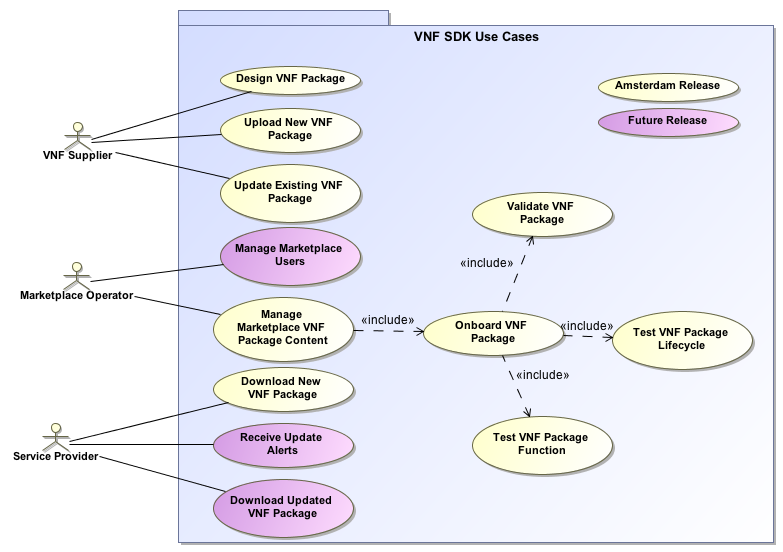Use Case Overview & Description
This requirement enhances the A1 interface capabilities provided in Rel 6 as part of 5G/ORAN & 3GPP Standards Harmonization requirement ( REQ-38) and extended in Rel 7 with the introduction of A1 policy management. O-RAN has defined A1 interface specification in the context of the management of 5G RAN elements to provide intent based policies for optimization of the RAN network performance. Planned enhancements for Rel 8 include support of new A1 interface version in alignment to O-RAN alliance and common logging/audit.
Use Case Key Information
| TOPIC | DESCRIPTION | WIKI PAGE |
| Requirements Proposal | This is a link to the requirements proposal made on the Requirements Sub-committee | |
| Architecture S/C info | Information on the Architecture sub-committee presentation | |
| Prior Project "Base" Wiki | Link to the "base" wiki for the Use Case, or work from a prior release. | |
| Requirements Jira (REQ-###) Ticket | Link to the REQ Jira ticket for this use case | |
| Key Use Case Leads & Contacts | USE CASE LEAD: @xyz USE KEY CONTACTS: | |
| Meetings Register & Recordings | Link to Use Case Team meetings. |
BUSINESS DRIVER
This section describes Business Drivers needs. These business drivers are presented on the Requirements Sub-committee and should also be put into the release requirements sub-committee page.
Key Contacts : John Keeney, Michela Bevilacqua
Executive Summary: This requirement enhances the A1 interface capabilities provided in Rel 6 as part of 5G/ORAN & 3GPP Standards Harmonization requirement ( REQ-38) and extended in Rel 7 with the introduction of A1 policy management. O-RAN has defined A1 interface specification in the context of the management of 5G RAN elements to provide intent based policies for optimization of the RAN network performance. Planned enhancements for Rel 8 include support of new A1 interface version in alignment to O-RAN alliance and common logging/audit.
Business Impact: Continuing the convergency between ONAP and ORAN for A1 interface to used by all service providers and avoid duplicate development efforts.
Business Markets: Enhanced A1 capabilities, once developed, will be useable by any service provider deploying and using ONAP.
Funding/Financial Impacts: A1 interface provides a flexible way for the operator to manage wide area RAN network optimization, reducing capex investment needs.
Organization Mgmt, Sales Strategies: There is no additional organizational management or sales strategies for this use case outside of a service providers "normal" ONAP deployment and its attendant organizational resources from a service provider.
Development Status
| PROJECT | PTL | User Story / Epic | Requirement |
| A&AI | |||
| AAF | |||
| APPC | |||
| CLAMP | |||
| CC-SDK | |||
| DCAE | |||
| DMaaP | |||
| External API | |||
| HOLMES | |||
| MODELING | |||
Multi-VIM / Cloud | |||
| OOF | |||
| OOM | |||
| POLICY | |||
| PORTAL | |||
| SDN-C | |||
| SDC | |||
| SO | |||
| VID | |||
| VF-C | |||
| VNFRQTS | |||
| VNF-SDK | |||
| CDS |
List of PTLs:Approved Projects
*Each Requirement should be tracked by its own User Story in JIRA
USE CASE DIAGRAM
Use cases define how different users interact with a system under design. Each use case represents an action that may be performed by a user (defined in UML as an Actor with a user persona).
Use Case Functional Definitions
Use Case Title | Title of the Use Case |
Actors (and System Components) | The list of Actors and System Components that participate in the Use Case |
Description | Short overview of the Use Case |
Points of Contact | Authors and maintainers of the Use Case. Use Case Lead, Key Use Case members and code contributors. |
Preconditions | A list of conditions that are assumed to be true before the Use Case is invoked Includes description of Information Consumed |
Triggers / Begins when | Describes the trigger for beginning the Use Case |
Steps / Flows (success) | Describes the sequence of steps and interactions that occur during the Use Case (may include: description, data exchanges, functionality, state changes) Interaction diagrams may be included or referenced |
Post-conditions | The expected results of the execution of the Use Case Includes description of Information Produced |
Alternate / Exception Paths | Description of any exceptions or special process that could occur during Use Case |
Related Use Cases | List of the Use Cases referenced by this Use Case |
Assumptions | Describes any assumptions that are made for this use case |
Tools / References / Artifacts | List of any tools or reference material associated with this Use Case as well as any JIRA trace-ability. List of any associated diagrams or modelling artifacts associated with the Use Case |
TESTING
Current Status
Testing Blockers
- High visibility bugs
- Other issues for testing that should be seen at a summary level
- Where possible, always include JIRA links
End to End flow to be Tested
**This should be a summary level Sequence diagram done in Gliffy**
Test Cases and Status
| 1 | There should be a test case for each item in the sequence diagram | NOT YET TESTED |
| 2 | create additional requirements as needed for each discreet step | COMPLETE |
| 3 | Test cases should cover entire Use Case | PARTIALLY COMPLETE |
